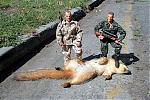Africa Report N°20623 Jul 2013
The February 2013 framework agreement signed by the UN, African organisations and eleven regional countries, as well as the deployment of an intervention brigade, represent yet another of many attempts to end the crisis in the Kivus. Conflicts in this region, however, stem mainly from competition between communities for land and economic opportunities and require tailored, grassroots solutions that should go beyond a military response and promote local conflict resolution. Those seeking to secure peace in the Kivus should gain sound knowledge of local dynamics and design strategies to tackle the root causes of violence and improve relations between communities.
The imperative of pursuing local responses to the crisis is illustrated by the longstanding conflict in the Ruzizi plain, located in Uvira territory at the border of South Kivu and Burundi. In a context of impunity and distrust, the assassination on 25 April 2012 of the Ruzizi plain traditional leader, who belongs to the Barundi community, sparked renewed violence between it and a rival community, the Bafuliro. Despite several reconciliation attempts by the central government and the UN Stabilisation Mission in Congo (MONUSCO), tensions persist in 2013.
The Bafuliro and Barundi have fought over land and traditional leadership in the Ruzizi plain since colonial times. Tensions remain high because of socio-economic underdevelopment, the mismanagement of land affairs and poor local governance due to weaknesses in provincial and central administration. Instead of acting as secondary figures, traditional chiefs play a leading role in Congo’s politics and administration. Perceived as influential during elections, they are part of political patronage networks and have support in national and provincial institutions.
Despite a decade of efforts to rebuild the Congolese state, the government remains ineffective in rural areas, leaving customary chiefs, whose role is recognised by the constitution but not fully defined, virtually in charge. They use their key position between the state and communities to benefit from any state and international investments and to protect their own interests. This fuels conflict, with intercommunal rivalries playing out in state institutions and among local and national politicians.
In 2012, aware of the hostility between the Bafuliro and Barundi, MONUSCO and local, provincial and national authorities attempted to mediate between the two communities. But although the leaders of both signed in September 2012 a code of conduct, fighting resumed shortly afterwards. The natural death of the Bafuliro traditional chief in December 2012 has led to a lull in violence, but the conflict, although, dormant, could easily flare up again.
The failure of mediation shows that local conflicts need local resolution strategies. These include controlling customary powers, setting up impartial and effective institutions to regulate and administer land, reducing armed violence and initiating intercommunal dialogue. Some of these measures will, admittedly, be more difficult to implement than others. But without an understanding of local issues, the peace process initiated by the UN, African Union (AU), Southern African Development Community (SADC), International Conference on the Great Lakes Region (ICGLR) and regional countries risks addressing symptoms rather than causes of conflict in the Kivus. Stabilisation initiatives in eastern Congo have so far been limited to military action against armed groups and top-down state building. This report, the first in a series that focuses on the local politics of conflicts in eastern Congo, recommends a complementary bottom-up approach aimed at improving intercommunal relations and restoring peace at the local level.
RECOMMENDATIONS
To enhance control of customary powers
To the DRC government and local authorities:
1. Disseminate the laws on customary powers to the population and customary authorities, and train customary chiefs so they can assume their functions in accordance with the law.
To improve land management
To the DRC government and local authorities:
2. Develop a land management code for traditional leaders in Uvira territory until more complete land reform that redefines the role of traditional authorities in land management is in place.
3. Provide land management institutions (the local courts and land administration) with human and financial resources; ensure all ethnic groups in Uvira territory are adequately represented in these institutions; and set up a district court in Uvira to bring land justice closer to claimants and speed up procedures.
To the UN and donors:
4. Establish, under the auspices of UN-Habitat, a land committee in Uvira territory that will identify the sources of land disputes and define a local land dispute resolution strategy.
5. Increase UN presence and coordination in Uvira by deploying staff of the UN Development Programme (UNDP), the UN Food and Agriculture Organization (FAO) and the UN-Habitat who will bring expertise in land dispute resolution and agricultural development to MONUSCO’s office in Uvira.
To restore dialogue between communities
To the UN and donors:
6. Commission a study on the local non-governmental organisations involved in conflict resolution in order to identify impartial local partners and strengthen their capacity to mediate disputes.
7. Commission a study to identify all parties to the conflict in order to organise truly inclusive activities to promote peace and intercommunal dialogue.
8. Disseminate, through the consultative local forum, the agreement signed by the Barundi and Bafuliro leaders, organise intercommunal meetings and promote joint development projects.
To reduce armed violence
To the DRC government and local authorities:
9. Launch investigations to identify the leaders of the main armed groups, arrest and try them, as well as those responsible for intercommunal clashes, outside South Kivu province.
To the DRC government, the UN and donors:
10. Produce a detailed intelligence report about the economic and logistical networks of armed groups that would inform a strategy to cut off their resources. The report should be a joint work of the UN group of experts and the officers of the joint border verification mechanism deployed by the ICGLR.
11. Implement a disarmament, demobilisation and reintegration program (DDR) that prioritises the communities of Uvira territory and the socio-economic reintegration of a majority of former Congolese combatants.
12. Deploy Congolese security forces that are not from South Kivu, increase the number of UN peacekeepers, and ensure both forces prioritise the fight against smuggling.
13. Formalise the mineral trade and use a share of the mining revenues to fund development programs targeting former combatants and the local population.
Nairobi/Brussels, 23 July 2013













Bookmarks